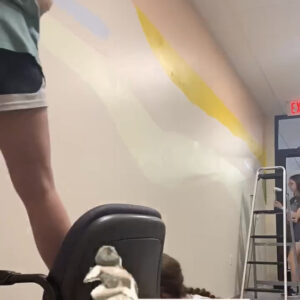Talent and a bachelor’s degree are no longer the only prerequisites for a strong career trajectory. Especially within the humanities and arts fields, employers want industry-connected experts with post-graduate degrees.
Increasingly, students from Oklahoma Christian University are considering graduate-level education to bridge liberal arts degrees with their desired professions.
Admitted to Parsons, The New School for Design for a Fashion Studies M.A. in New York City, Aimee Williams discussed the prospect of graduate school with two fellow graduate candidates: senior Stanton Yeakley, admitted to the University of Tulsa’s competitive law program, and senior Cody Summerville, who is attending The University of Texas in Austin for a Curriculum Instruction M.A.
Williams: Tell me about the graduate programs you’ve been accepted to.
Yeakley: The University of Tulsa has a really good law program that I’ve been accepted to. The school tends to produce really successful students in the law field at a regional level, so I think it’s going to give the best opportunities.
Summerville: UT’s Curriculum and Instruction M.A. focuses on Pre-K to 3rd-grade instruction, but will take me beyond what I’ve learned at an undergraduate level so I can eventually work on a national level.
Williams: Pursuing a graduate degree isn’t an easy choice for everyone, but I knew going into OC that I wanted to go to grad school. When did you decide graduate school was going to be a viable route?
Summerville: I also knew I wanted to get my master’s before starting at OC. I did change my major a couple of times, from music to elementary education, and then to early-childhood education, but I was always going to pursue graduate school.
Yeakley: Coming in to college I didn’t know what I wanted to do. As an English major, I started thinking about that more, and what I envisioned for myself didn’t seem to fit with the opportunities I saw in English/literature degrees. So I decided to really look at the skills I was learning in the English department, and that led me to the English/pre-law track.
Williams: The process for applying to grad schools is time consuming and stressful. Because I want to live on the East Coast, I based my applications on program location, prestige and curriculum, in that order. How did you both decide which programs to apply for?
Yeakley: I applied to a few really prestigious programs, some mid-level programs, and a couple of law programs I knew I could get accepted to. I also narrowed the process down by applying to top-ranked law schools close by, maybe two-to-eight hours away since I want to stay around this area. For law school the application process is pretty streamlined, and most everything is online.
Summerville: I looked at which programs were going to give me the best education, as well as the best opportunities to advance in my career, so I applied to schools everywhere. I applied to Michigan State, Colombia, the University of Pennsylvania and to the University of Texas. I didn’t have an interview with the schools I applied to, but I did talk on the phone with professors from each program, and I think that really helped me get into UT.
Williams: Stanton, I know you were accepted to a number of competitive programs.
Yeakley: I was accepted to nine out of the 12 programs I applied to, and waitlisted at one.
Williams: How much of a factor did scholarships and funding play in your decisions?
Summerville: Tuition is so cheap for me at UT that it didn’t really matter what kind of scholarship I received. Because education is one of the most under-funded fields, my program doesn’t offer paid teaching assistantships for master’s students – they save that for the Ph.D. students. UT does offer fellowships in my program for the second year, unfortunately I’m going to complete the program in one year, and so I won’t be eligible.
Yeakley: With the nine schools I got in to, I didn’t receive any less than half of the cost of attendance for each program. Some schools gave me in-state tuition even though I was an out-of-state candidate. With Tulsa, after I went to an interview in person, they decided to give me a full ride, which was a great incentive to attend.
Williams: Both of my parents have bachelor’s degrees, but they aren’t familiar with graduate school, so I had to convince them that a master’s degree is my best bet. How have your parents responded to your grad school choices?
Summerville: Even in high school my parents knew I’d go to grad school, so when I started actually throwing some of the schools names around, they said, “Why so far away? It’s going to be so expensive.” But luckily for them I ended up going with UT because I really like the flexibility of the program, and because in-state tuition is much cheaper. So my mom is happy – it’s really close to home.
Yeakley: When I told my parents I was switching my degree to English/pre-law, they were really happy about it. They are really excited at any opportunity I have at getting a good job later on. I didn’t really consult my parents much during the actual application process. They knew I’d make a good choice.
Williams: The fashion industry is extremely elite, and without going to Parsons, it would be much more difficult to fulfill my career aspirations. What will a graduate-level education help you accomplish that you otherwise would not be able to?
Summerville: In education as an undergrad, there’s not much flexibility with classes or research opportunities. With an M.A., I will get those opportunities and I can focus on my own research interests. UT is one of the top 10 schools for education in the country, and almost everyone in the U.S. Department of Education in the Early Learning Department has their masters from UT, so knowing I can connect with those alumni is encouraging because I know I can get to where I want to be.
Yeakley: You have to continue with education if you want to work in law, but getting the practical experience through internships and connections during law school will ultimately lead to a job. Also, going to Tulsa will allow me to work in a specific area of law, and will make it easier for me to get a job in the region I want to be in. In general, I think grad school leads to more kinds of opportunities, especially when you’re coming out of a humanities background.
Aimee Williams is a senior at Oklahoma Christian University














Be First to Comment